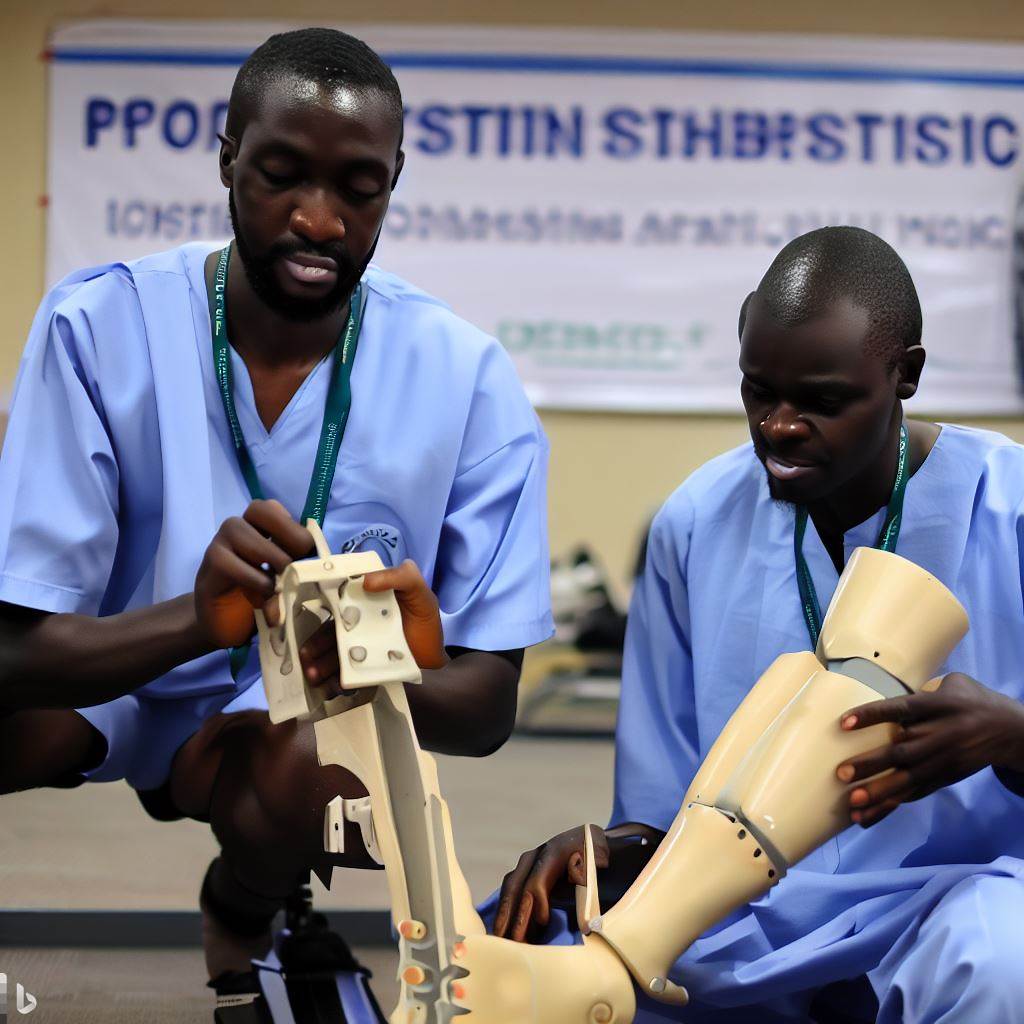Introduction
An exercise physiologist is a healthcare professional who specializes in studying the effects of exercise on the body.
With the growing need for healthier lifestyles in Nigeria, the demand for exercise physiologists is increasing.
Exercise physiologists are experts in designing and implementing exercise programs, conducting fitness assessments, and advising on nutrition.
They work closely with individuals to improve health, prevent chronic diseases, manage chronic conditions, and enhance athletic performance.
The role of exercise physiologists is crucial in promoting physical activity and overall well-being in society.
In Nigeria, where sedentary lifestyles and chronic diseases are prevalent, exercise physiologists can make a significant impact.
They can provide specialized care for conditions such as heart disease, obesity, diabetes, and hypertension.
Exercise physiologists also collaborate with healthcare professionals, including doctors and physical therapists, to develop comprehensive treatment plans.
The field of exercise physiology is rapidly expanding in Nigeria, offering diverse career opportunities in various settings.
Exercise physiologists can work in hospitals, rehabilitation centers, sports clinics, research institutions, and fitness centers.
They play a vital role in educating and motivating individuals to adopt healthier lifestyles and reach their fitness goals.
In essence, as the need for healthier lifestyles grows in Nigeria, exercise physiologists have become essential healthcare professionals.
Their expertise in exercise prescription, health promotion, and disease prevention can significantly improve the well-being of individuals and communities.
Education and Training Requirements
To become an exercise physiologist in Nigeria, you will need a bachelor’s degree in exercise physiology or a related field.
It is important to pursue further education, such as a master’s or doctoral degree, to enhance your knowledge and skills.
Some relevant certifications and licenses may be required, depending on the specific area of practice.
Educational Background
In order to become an exercise physiologist in Nigeria, a strong educational background is necessary. This typically starts with obtaining a bachelor’s degree in exercise physiology or a related field.
It is important to choose a reputable institution that offers a comprehensive curriculum related to exercise physiology.
A bachelor’s degree in exercise physiology will provide you with a solid foundation in understanding the human body and its response to exercise. You will learn about anatomy, physiology, biomechanics, and exercise prescription.
These courses will equip you with the knowledge and skills necessary to assess, design, and implement exercise programs for individuals with various health conditions.
Importance of Further Education
While a bachelor’s degree is the minimum requirement to work as an exercise physiologist, pursuing further education is highly recommended. Obtaining a master’s or doctoral degree in exercise physiology or a related field will provide you with advanced knowledge and skills to excel in this profession.
Further education will allow you to specialize in a particular area of interest within exercise physiology.
For example, you may choose to focus on sports performance, cardiac rehabilitation, or clinical exercise physiology. Specialization will enhance your expertise and increase your career opportunities.
Certifications and Licenses
In addition to a strong educational background, certain certifications and licenses may be required to practice as an exercise physiologist in Nigeria. These certifications ensure that professionals meet specific standards and have the necessary qualifications to provide safe and effective care.
One example of a relevant certification is the Certified Exercise Physiologist (CEP) credential offered by the American College of Sports Medicine (ACSM). This certification signifies that individuals have met the necessary educational and experiential requirements and have passed a rigorous examination.
Additionally, some states or institutions may require exercise physiologists to hold specific licenses or be registered with a professional organization. It is important to research the requirements in your specific area of practice to ensure compliance.
Basically, becoming an exercise physiologist in Nigeria requires a strong educational background, including a bachelor’s degree in exercise physiology or a related field. Pursuing further education, such as a master’s or doctoral degree, is highly beneficial to enhance knowledge and skills.
Additionally, obtaining relevant certifications and licenses may be necessary to practice as an exercise physiologist in Nigeria.
Read: Interviews with Successful Nigerian Cardiovascular Technologists
Key Skills and Qualities for Exercise Physiologists
Exercise physiologists play a crucial role in helping individuals achieve their fitness and health goals. To excel in this field, exercise physiologists must possess certain key skills and qualities.
Here are some of the essential skills for exercise physiologists:
- Knowledge of anatomy, physiology, and exercise science: A strong foundation in these areas is essential for exercise physiologists to understand how the body responds to exercise and design effective workout plans.
- Communication and interpersonal skills: Exercise physiologists need to effectively communicate with clients, listen to their concerns, and provide clear instructions to ensure they perform exercises safely and correctly.
- Analytical skills: The ability to analyze data is crucial for exercise physiologists to evaluate clients’ progress, identify areas for improvement, and make evidence-based decisions.
- Fitness assessment: Exercise physiologists should be skilled in conducting various fitness assessments, such as testing cardiovascular endurance, muscular strength, and flexibility, to gather baseline data and track improvements.
- Designing personalized exercise programs: Tailoring exercise programs to meet individual goals and needs is a fundamental skill exercise physiologists must have.
- Ability to motivate and inspire: Exercise physiologists need to possess the ability to motivate and inspire clients, helping them stay committed to their exercise routines and achieve long-term success.
- Problem-solving: Exercise physiologists often encounter challenges with clients, such as injuries or plateauing progress. Being able to find creative solutions is vital in overcoming these obstacles.
- Adaptability: Every client is unique, and exercise physiologists must adapt their approach to accommodate diverse needs, abilities, and preferences.
- Continual learning: Staying updated with the latest research, trends, and innovations in the field of exercise science is important for exercise physiologists to provide the most current and effective guidance to clients.
- Professionalism and ethics: Exercise physiologists must uphold high ethical standards, respect client confidentiality, and maintain a professional demeanor at all times.
Exercise physiologists must have a strong foundation in anatomy, physiology, and exercise science, along with effective communication skills.
Data analysis and interpreting fitness assessments are vital for designing personalized exercise programs. They play a crucial role in helping individuals achieve their fitness and health goals.
Read: Advanced Training Opportunities for Cardiovascular Technologists

Career Pathways
When it comes to becoming an exercise physiologist in Nigeria, there are a variety of career options available for professionals in this field. Whether you prefer working in hospitals, sports medicine clinics, fitness centers, or as independent consultants, there is a pathway that suits your interests and goals.
In this section, we will provide an overview of different career options and discuss potential growth opportunities and areas of specialization.
Working in Hospitals
Exercise physiologists play a crucial role in hospitals, where they work closely with healthcare professionals to develop exercise programs for patients with chronic conditions or those recovering from surgeries.
In this setting, they assess patients’ physical abilities, design tailored exercise plans, monitor progress, and provide necessary support and guidance.
Read: Challenges and Solutions in Nigeria’s Social Work Practice
Sports Medicine Clinics
For those passionate about sports and helping athletes enhance their performance, a career in sports medicine clinics can be highly rewarding.
Exercise physiologists working in this field work with athletes of all levels to develop training programs that optimize their physical capabilities and prevent injuries.
Fitness Centers
Many exercise physiologists find employment in fitness centers, where they help individuals achieve their fitness goals and improve their overall health.
They conduct fitness assessments, design exercise programs, provide nutritional advice, and motivate clients to stay committed to their routines.
Independent Consultants
For professionals who prefer greater flexibility and autonomy, working as independent consultants is a viable career option.
These exercise physiologists can offer their services to a range of clients, including individuals, sports teams, corporate wellness programs, or community organizations.
Growth Opportunities in the Field
As the importance of exercise physiology in improving health and well-being becomes increasingly recognized, there are ample growth opportunities in this field.
Professionals can pursue advanced certifications, such as becoming a certified strength and conditioning specialist, which opens doors to higher-level positions and increased responsibilities.
Possibility of Specialization
Exercise physiology offers professionals the chance to specialize in various areas based on their interests and career goals. Some common specializations include cardiac rehabilitation, sports performance enhancement, pediatric exercise science, and geriatric exercise physiology.
By specializing, exercise physiologists can enhance their expertise and become sought-after professionals in their chosen fields.
Scope of Employment in Various Sectors
The scope of employment for exercise physiologists extends beyond just healthcare.
With the growing awareness of the importance of physical fitness, exercise physiology professionals are in demand in various sectors, including sports teams, corporate wellness programs, rehabilitation centers, research organizations, and government agencies.
In general, the career pathways for exercise physiologists in Nigeria are diverse and full of opportunities. Whether you choose to work in hospitals, sports medicine clinics, fitness centers, or as an independent consultant, there are various avenues to apply your knowledge and skills.
With the potential for growth and specialization, exercise physiology offers a fulfilling career with the chance to make a positive impact on people’s lives.
Read: Understanding the Educational Requirements for Nigerian Nutritionists
Job Responsibilities
Exercise physiologists in Nigeria have a wide range of duties and responsibilities.
Here is a detailed outline of their primary job responsibilities:
Client Assessment and Monitoring
Exercise physiologists are responsible for assessing and monitoring their clients’ fitness levels and overall health. This includes conducting fitness tests and evaluating their health history to understand their specific needs and limitations.
During the client assessment process, exercise physiologists measure various aspects of their clients’ physical fitness, such as cardiovascular endurance, muscular strength, and flexibility. They may use tools like treadmills, weight machines, and flexibility tests to gather data.
After gathering all the necessary information, exercise physiologists use their expertise to interpret the data and create personalized exercise plans for their clients.
Read: The Role of Exercise Physiology in Nigeria’s Sports Industry
Designing and Implementing Exercise Plans
Exercise physiologists design and implement exercise plans tailored to their clients’ goals and needs. These plans may vary depending on the client’s age, fitness level, medical conditions, and personal preferences.
Based on the assessment results, exercise physiologists determine the appropriate types of exercises and intensity levels for their clients. They may incorporate a variety of exercises, including cardiovascular activities, resistance training, flexibility exercises, and core strengthening exercises.
Exercise physiologists also educate their clients on proper exercise techniques, ensuring they perform the exercises safely and effectively.
They may demonstrate correct form and provide verbal cues to prevent injuries and optimize the benefits of the exercises.
Providing Guidance and Motivation
Exercise physiologists play a crucial role in providing guidance and motivation to their clients. They assist their clients in setting realistic and achievable goals and help them track their progress over time.
Exercise physiologists provide ongoing support and encouragement to keep their clients motivated throughout their fitness journey.
hey may introduce new exercises, modify existing routines, and provide regular feedback to ensure continuous improvement and prevent boredom.
In addition to exercise guidance, exercise physiologists also educate their clients on healthy lifestyle habits, including proper nutrition and stress management techniques.
Exercise physiologists often work closely with other healthcare professionals, such as physicians and physical therapists, to develop comprehensive treatment plans for clients with specific medical conditions or injuries.
In summary, exercise physiologists in Nigeria have diverse responsibilities, ranging from client assessment and monitoring to designing personalized exercise plans and providing guidance and motivation.
They play a crucial role in helping individuals improve their health and overall well-being through exercise and lifestyle modifications.
Read: How Cardiovascular Technologists Contribute to Heart Health in Nigeria
Challenges and Rewards of the Profession
Identification of common challenges faced by exercise physiologists in Nigeria
- Limited resources for research and equipment hinder the advancement of exercise physiology.
- Cultural barriers, such as traditional beliefs, may discourage people from seeking professional help.
- Lack of awareness among the general public about the role and benefits of exercise physiology.
Highlighting the personal and professional rewards that come with this profession
- The opportunity to make a positive impact on improving people’s health and well-being.
- The satisfaction of witnessing clients achieve their fitness goals and improve their quality of life.
- Continuous learning and professional growth in the field of exercise physiology.
- The ability to work with a diverse range of individuals and tailor exercise programs to their specific needs.
Encouragement to overcome challenges and pursue a fulfilling career as an exercise physiologist
Becoming an exercise physiologist in Nigeria may come with challenges, but the rewards are significant.
By addressing limited resources and cultural barriers, exercise physiologists can create a positive change in society.
The impact on improving people’s health and well-being can be immensely fulfilling. Overcoming challenges requires perseverance and a passion for helping others.
By spreading awareness and educating the public about the benefits of exercise physiology, barriers can be broken. Exercise physiologists should continuously seek opportunities for professional growth and stay updated with research advancements.
Networking with other professionals in the field can provide support and open doors for collaboration. Joining relevant associations and attending conferences can also enhance professional development.
By staying motivated and dedicated, exercise physiologists can build a fulfilling career in Nigeria.
In the end, exercise physiology in Nigeria faces challenges such as limited resources, cultural barriers, and lack of awareness.
However, the rewards of the profession, including improving people’s health and well-being, make it a worthwhile path to pursue.
By overcoming challenges, staying motivated, and continuously learning, exercise physiologists can create a positive impact on society.
Conclusion
Becoming an exercise physiologist in Nigeria requires several essential steps. Firstly, acquiring the necessary education through a bachelor’s degree in exercise physiology or a related field is crucial.
Additionally, developing key skills such as knowledge of anatomy, physiology, and rehabilitation techniques is important.
Understanding the career opportunities available in Nigeria, such as working in hospitals, fitness centers, or sports organizations, is also essential. By following these steps, individuals can pave the way for a successful career in exercise physiology.
We would like to offer our final words of encouragement to those interested in pursuing this rewarding profession.
As an exercise physiologist, you have the opportunity to make a positive impact on people’s lives by promoting health and wellness through exercise.
For those ready to take the first steps towards a career as an exercise physiologist in Nigeria, we urge you to explore further resources. There are various organizations, educational institutions, and online platforms that can provide valuable information and guidance.
Don’t let anything hold you back from pursuing your passion for exercise physiology. Take action today and begin your journey towards a fulfilling and impactful career as an exercise physiologist in Nigeria!
Publish Your Professional Profile, Business or Brand
Showcase your expertise, gain trust, and boost visibility instantly on Professions.ng.
Publish Now



